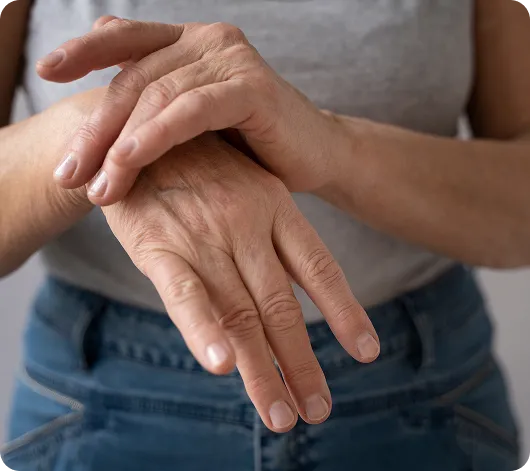Pinched Nerve Relief That Works
Minimally invasive care to ease pressure, restore function, and relieve discomfort

Understanding Pinched Nerves and How We Treat Them
A pinched nerve happens when a spinal nerve becomes compressed by pressure due to a correlated condition or physical trauma. When this happens, the normal functioning of nerves becomes interrupted and sends pain signals into the brain. Some common symptoms of a pinched nerve include tingling, numbness, and weakness.
Pain inflicted by a pinched nerve in the lumbar area can severely hinder regular activities and limit mobility. It’s crucial to first identify the root cause or correlated condition for a pinched nerve in order to start a nerve regeneration or pain management procedure. Timely intervention and treatment can prevent possible complications and help restore spinal health.
Understanding Pinched Nerves and How We Treat Them
A pinched nerve happens when a spinal nerve becomes compressed by pressure due to a correlated condition or physical trauma. When this happens, the normal functioning of nerves becomes interrupted and sends pain signals into the brain. Some common symptoms of a pinched nerve include tingling, numbness, and weakness.
Pain inflicted by a pinched nerve in the lumbar area can severely hinder regular activities and limit mobility. It’s crucial to first identify the root cause or correlated condition for a pinched nerve in order to start a nerve regeneration or pain management procedure. Timely intervention and treatment can prevent possible complications and help restore spinal health.

What Causes a Pinched Nerve?
Pinched nerves can have multiple causes and often appear alongside other back and neck conditions. These could include intervertebral disc disorders like a herniated disc or spondylolisthesis or related to an increase in spinal pressure, as in spinal stenosis.
Other factors like infections, tumors, or physical trauma could also contribute to developing a pinched nerve.
What are the symptoms of a pinched nerve?
The most common symptoms of a pinched nerve may include:
✔ Radiating or sharp pain in the affected lumbar area ranging from mild to severe intensity
✔ Loss of sensation in the spine along with tingling
✔ Appearance of muscle weakness due to nerve compression
✔ Sensory changes perceived as a hypersensitivity to touch in the affected area
How is a pinched nerve diagnosed?
To confirm a diagnosis, your healthcare provider will typically follow this process:
Family medical history: To evaluate potential hereditary contributions.
Physical examination: Focused on your spine, lower back, and legs.
Imaging studies: X-rays, MRIs, or CT scans to detect disc damage or nerve compression.
Diagnostic nerve blocks: Temporary numbing of nerves to isolate the exact source of pain.
Treatment Options for a Pinched Nerve
Once the root cause for the pinched nerve is identified, procedures may range from conservative therapies to injections and minimally invasive interventions.
Conservative Therapies
Non-invasive therapies can be effective for mild to moderate cases:
✔ Massage therapy: Reduces muscle tension and nerve pressure.
✔ Acupuncture: Stimulates pressure points to relieve pain.
✔ Chiropractic care: Focuses on spinal alignment to reduce compression.
Lifestyle Changes
Certain habits can alleviate stress on the spine and support recovery:
✔ Engage in low-impact activities like walking, swimming, or cycling.
✔ Use ergonomic seating and maintain proper posture, especially when working at a desk.
✔ Manage weight to reduce pressure on spinal nerves.
✔ Follow a healthy diet and avoid smoking or heavy alcohol use to promote spinal health.
Non-Opioid Medications
Non-opioid medication significantly reduces the risk of addiction and has fewer side effects. They are also less likely to cause drowsiness or impaired driving conditions. It is recommended to be used in combination with other treatments, such as physical therapy or chiropractic care.
Injections
Some of the injections recommended to treat a pinched nerve include steroid injections. These may be injected near the spinal nerve area, blocking the transmission of pain signals. Additionally, facet joint injections, which target the joints located on the vertebra causing nerve compression, may also be used.
Pain Management Procedures
These techniques interrupt pain signals and improve quality of life:
✔ Radiofrequency ablation: Uses heat to reduce nerve sensitivity.
✔ Nerve blocks: Temporarily disable pain pathways.
✔ Spinal cord stimulation: Sends mild electrical pulses to block pain perception in the brain.
Neuromodulation
This treatment modifies nerve activity using electrical stimulation:
✔ TENS (Transcutaneous Electrical Nerve Stimulation): Uses low-voltage currents to disrupt pain signals.
✔ Peripheral nerve stimulation: Targets nerves near the spine using electrical impulses.
Minimally Invasive Interventions
These outpatient procedures offer faster recovery and fewer risks than surgery:
✔ Microdiscectomy: Removes part of a damaged disc to relieve nerve pressure.
✔ Laminectomy: Removes a portion of the vertebral arch (lamina) to decompress nerves.
✔ Foraminotomy: Enlarges the space where nerve roots exit the spinal canal.

Care That’s Close to Home
We offer care from two convenient clinic locations, making it easy to access expert medical support close to home.
Each facility is designed to provide a welcoming, safe, and efficient environment equipped with advanced technology and supported by a compassionate team dedicated to your well being.
Tualatin Clinic
Newberg Clinic
Care That’s Close to Home
We offer care from two convenient clinic locations, making it easy to access expert medical support close to home.
Each facility is designed to provide a welcoming, safe, and efficient environment equipped with advanced technology and supported by a compassionate team dedicated to your well being.
Tualatin Clinic
Newberg Clinic

Why Choose Spinal Diagnostics?
Patients choose Spinal Diagnostics for our comprehensive approach, accurate diagnostics, and compassionate care. We stay at the forefront of interventional procedures and are committed to improving your quality of life—without opioids or invasive surgeries.
Proven Medical Expertise
We bring years of clinical experience in pain management and interventional procedures.
Constant Innovation
We use the latest techniques and technology to ensure safe, effective treatment.
Compassionate Care
We listen, understand, and treat every patient with empathy and respect.
Personalized Plans
Each treatment is tailored to your condition, goals, and lifestyle.
Explore the treatments that bring real relief.
Learn how our non-invasive solutions and personalized plans can help you feel better, faster.
Explore the treatments that bring real relief.
Learn how our non-invasive solutions and personalized plans can help you feel better, faster.

